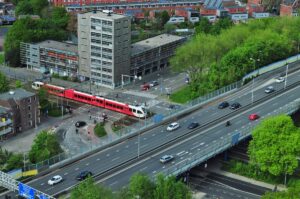
To continue last week’s topic, today’s article aims to discuss the social impact of the issues within the Dutch public transport.
In the Netherlands, one in ten adults is finding it increasingly difficult to afford transport costs, from fuel for a car or scooter to a simple train ticket. Many residents struggle to cover these expenses, spending more than they can afford or cutting back on other necessities to maintain their mobility. This issue has significant societal implications, as mobility restrictions can isolate individuals from essential social, professional, and familial engagements. According to the Netherlands Institute for Transport Policy Analysis (KiM), a government-backed research body, these mobility challenges disproportionately affect low-income groups, single-parent households, and the unemployed.
Financial Sacrifices and Social Isolation
KiM’s study revealed that a small percentage of Dutch adults—between 1% and 5.5%—often miss social gatherings or events, like family functions, because they cannot afford the travel expenses. This lack of mobility not only affects personal connections but also limits access to work, healthcare, and education. As such, mobility challenges deepen financial strain and social isolation for vulnerable groups, urging the government to direct financial relief measures toward these households.
Increasing Transport Costs Over Time
On average, Dutch households spend about 14% of their income on transport, a percentage that has been rising. Over the past eight years, transport prices have increased by 30%, outpacing the general inflation rate. While fuel prices for fossil-fuel vehicles have seen the steepest increase, public transport fares and bicycle-related costs have risen more moderately. This escalation in transport costs has made it harder for low-income households to afford mobility, especially those dependent on cars in regions with limited public transport options.
The Impact of Energy Transition on Transport Costs
As the Netherlands pushes toward sustainable mobility through the energy transition, many households face an increasing risk of “transport poverty.” This refers to the inability of individuals or families to afford transportation costs, particularly as fossil-fuel-driven vehicles become more expensive due to rising fuel taxes and environmental regulations. The transition to greener transport options like electric cars is financially out of reach for many low-income households, leaving them vulnerable to higher fuel costs and new regulations.
According to research by the Dutch Organization for Applied Scientific Research (TNO), between 113,000 and 270,000 Dutch households are considered at risk due to a combination of low income and high car mileage. These households typically live in medium-sized cities with limited public transport access, making car dependence a necessity. Moreover, many of these households lack the financial assets to switch to electric vehicles, further exacerbating their vulnerability to rising transport costs.
Geographic Disparities in Transport Accessibility
TNO’s analysis showed that vulnerable households are concentrated in certain regions, such as the southeastern edge of the country, including areas like Venlo, Enschede, and metropolitan districts of Rotterdam and Almere. These areas tend to have poorer public transport services, forcing residents to rely heavily on cars. Additionally, many of these households spend between 10% and 12% of their income on fuel, compared to a national average of 4.5%. The high mileage driven by these families is not just for commuting but extends to pensioners and those on benefits, highlighting the broad impact of transport costs.
Policy Challenges and Recommendations
The Dutch government’s efforts to mitigate transport costs, such as reducing excise duties on fuel between April 2022 and July 2023, provided temporary relief. However, this approach has been criticized as inefficient because it disproportionately benefits wealthier households who spend a smaller percentage of their income on fuel. For vulnerable households, the reduction in fuel excise duty saved them approximately €260 to €300 annually, compared to an average of €185 for other car owners. Nonetheless, this measure is not seen as a cost-effective way to help those most at risk of transport poverty.
TNO’s study calls for targeted solutions that focus on expanding affordable and sustainable transport options, such as electric bicycles, shared transport, and improved public transport services. Policies that encourage the development of housing near essential services and jobs, reducing the need for long commutes, are also crucial. This would help lessen the financial burden on households that cannot afford the transition to greener transport options.
Public Transport Accessibility Decline: A Looming Crisis
In addition to the rising costs of car-based travel, public transport in the Netherlands is also facing challenges. A recent report by the Dutch Environmental Assessment Agency (PBL) highlights a sharp decline in public transport services, particularly in rural areas and on the outskirts of cities. Since 2012, many regions have seen bus and train services cut, leaving residents with fewer travel options and longer travel times to reach essential services like hospitals, schools, and workplaces.
For example, in the northern provinces of Drenthe, Groningen, and Friesland, bus stops have decreased by 7% to 17% in recent years, exacerbating the mobility challenges for residents without cars. The report finds that 30% of senior citizens in these regions cannot reach a hospital within 30 minutes by public transport, and 17% of children face similar barriers in accessing schools.
Growing Disparity Between Car Owners and Public Transport Users
The PBL report underscores the growing inequality between those who own cars and those who rely on public transport. Car owners enjoy more reliable access to jobs and services, while public transport users face delays and limited service, particularly during off-peak hours. This disparity further disadvantages low- and middle-income workers, especially those in jobs located in areas with poor public transport connections.
Moving Forward: Investing in Sustainable Mobility
To address these issues, the PBL calls for increased investment in public transport, cycling infrastructure, and better integration of public transport hubs with essential services. Without these interventions, the accessibility gap between car owners and public transport users will continue to widen, further marginalizing those who cannot afford a car or sustainable transport options.
To conclude, while transport costs and accessibility remain pressing challenges for a significant portion of the Dutch population, particularly low-income households, targeted policies and investments can help reduce transport poverty and ensure mobility for all. As the Netherlands transitions to a more sustainable future, it is essential that vulnerable households are not left behind in this crucial aspect of everyday life.
References
Mulder, P. (2024, March 04). Many Dutch households risk facing transport poverty in the transition to sustainable mobility. Retrieved from European Commission : https://urban-mobility-observatory.transport.ec.europa.eu/news-events/news/many-dutch-households-risk-facing-transport-poverty-transition-sustainable-mobility-2024-03-04_en
NL Times. (2024, August 27). One in ten Dutch struggling to afford transport. Retrieved from NL Times: https://nltimes.nl/2024/08/27/one-ten-dutch-struggling-afford-transport
The Northern Times. (2024, September). Transit trouble: The Netherlands faces a public transport crisis. Retrieved from The Northern Times: https://northerntimes.nl/transit-trouble-the-netherlands-faces-a-public-transport-crisis/?amp=1
Photo: https://c.pxhere.com/photos/1d/56/city_crossing_crossroad_highway_overpass_small_town_street_traffic-1153738.jpg!d



